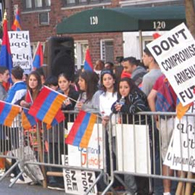Azerbaijan, Baku, Oct. 15 / Trend E.Tariverdiyeva /
Interior confrontation Armenia caused by the opposition's dissatisfaction with the normalization of relations with Turkey will not lead to replacement in state power in the country, experts believe.
"I doubt very much whether the ratification would lead to a change of leadership in Armenia.
The problem is that nobody has enough power to overthrow the present government", believes Amanda Akcakoca, European Expert on South Caucasus.
Despite the ban of Yerevan executive Power, the Dashnaktsutiun party will rally on Oct.16 to protest the Armenian-Turkish protocols.
"[...] our goal is to explain the public and authorities the threat of these protocols and to persuade them to retreat from that decision," head of the Dashnaktsutsun Revolution Federation Parliamentary Group Vaan Ovannisyan said at the news-conference in Yerevan, the Mediamax reported.
Speaking about the possible demand on the resignation of the Armenian President, Ovannisyan noted that the change of power is not an end in itself. It can only be a mean to achieve the main goal - the refusal to ratify the protocol.
Turkish and Armenian Foreign Ministers, Ahmet Davudoglu and Edward Nalbandian signed the Ankara-Yerevan protocol in Zurich on Oct. 10.
Armenian-Turkish ties have been severed since 1993 due to Armenia's claims to recognize so-called "Armenian genocide" and Armenia's occupation of Azerbaijani lands.
According to observers, the internal situation in Armenia will heat up, but will not lead to a change in the leadership of the country.
The path ahead is full of potholes and will be particularly difficult for Armenia, Akcakoca believes.
"Parliamentary majority of Armenia will face a growing reaction and pressure from both the Dashnaks inside the country and externally from the diaspora community who are extremely unhappy about a number of elements in the Protocol, Expert of the European Policy Centre (Belgium), Akcakoca wrote to Trend by email.
Although, opposition will do their best to prevent ratification, Sarkisian needs to stay strong and bite the bullet. Firstly because his credibility is at stake but also because at the end of the day Armenia will be better off all round with normalization of relations with Turkey which should bring an end to their isolation, the expert said.
According to the Turkish political scientist Sinan Ogan, despite the fact that Armenia's opposition is radical, at the moment it will not take extreme measures.
"I believe no radical changes in the Armenian policy will take place in the near future, director of the Turkish Center for International Studies and Strategic Analysis Ogan said over the telephone.
The outlook for any possible "change of leadership" within Armenia depends on a very different set of variables, Director of the Armenian Center for National and International Studies (ACNIS) Richard Giragosian believes.
Although the external factors of the normalization effort with Turkey and the outcome of the protocols play an important role in determining the future of the current Armenian government, these issues serve more as secondary pressures, as the real test is strictly internal in nature, Giragosian added.
The Armenian government of President Serzh Sargsyan has largely been driven by a need or even a sense of "desperation" for a success in foreign policy, to both endow it with a greater sense of legitimacy and to distract scrutiny away from domestic deficiencies in democratization, the director wrote to Trend via e-mail.
This is due to the impact of Armenia's post-election crisis of last year, which remains unresolved and that has made this particular Armenian government more unpopular and much less legitimate than any previous Armenian government.
"This also means that even in the "best case" scenario, assuming a complete "diplomatic victory" by Armenia in terms of forging new relations with Turkey, such "success" will do little to solve the underlying problems and shortcomings in the lack of democracy and authoritarian rule within Armenia," the expert said.
R.Hafizoglu and V.Zhavoronkova contributed to the article.






